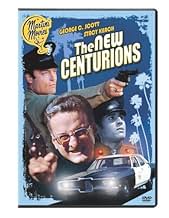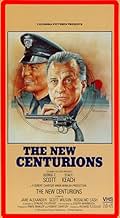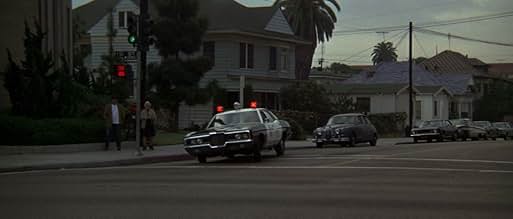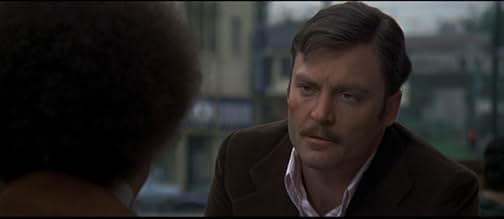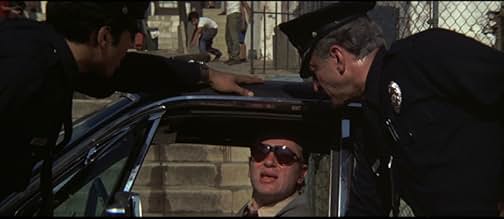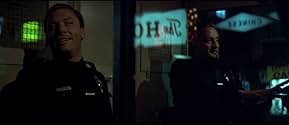IMDb RATING
7.0/10
3.7K
YOUR RATING
Family man Roy Fehler joins the L.A.P.D. to make ends meet while finishing law school and is indoctrinated by seasoned veteran Kilvinski. As time goes on, Roy loses his ambitions and family ... Read allFamily man Roy Fehler joins the L.A.P.D. to make ends meet while finishing law school and is indoctrinated by seasoned veteran Kilvinski. As time goes on, Roy loses his ambitions and family as police work becomes his entire life.Family man Roy Fehler joins the L.A.P.D. to make ends meet while finishing law school and is indoctrinated by seasoned veteran Kilvinski. As time goes on, Roy loses his ambitions and family as police work becomes his entire life.
- Director
- Writers
- Stars
Richard E. Kalk
- Milton
- (as Richard Kalk)
Peter De Anda
- Gladstone
- (as Peter DeAnda)
- Director
- Writers
- All cast & crew
- Production, box office & more at IMDbPro
Featured reviews
Stacy Keach and George C. Scott star in this very gritty, very honest portrayal of early-70s police life. It's directed by Richard Fleischer, who usually worked on much flashier material than this. I've seen a lot of films that dug in and tried to paint a clear image of police life, but this story brings a level of realism that is somewhat missing in most cases - it was written by a cop (Joseph Wambaugh).
"The New Centurions" is a title that hints at a much deeper perspective into familiar territory. Even though all the suspected clichés are still somewhat in place, they're there out of reality rather than just filling space in a movie plot. George C. Scott's character is on his way to retirement, but instead of him not making it, he takes a much darker path. It's that darker path, and the sense of hope behind it, that informs both Scott and Keach in their fantastic performances. They're as good as they'd ever been here - deep, powerful, and incredibly personal. There's a real emotional vulnerability on display that can't be denied.
"The New Centurions" is a title that hints at a much deeper perspective into familiar territory. Even though all the suspected clichés are still somewhat in place, they're there out of reality rather than just filling space in a movie plot. George C. Scott's character is on his way to retirement, but instead of him not making it, he takes a much darker path. It's that darker path, and the sense of hope behind it, that informs both Scott and Keach in their fantastic performances. They're as good as they'd ever been here - deep, powerful, and incredibly personal. There's a real emotional vulnerability on display that can't be denied.
Joseph Wambaugh had a string of best-selling novels in the 1970's, all based on his experiences as a beat cop in the Los Angeles Police Department. 'The New Centurions' was one such novel, and this is the film of the book. Wambaugh's familiar world of drunks, domestic disputes, whores and 'busting fruits' is set out here with reasonable exactitude. Sterling ('Towering Inferno') Silliphant's screenplay is somewhat sluggish, but the Wambaugh ambience is immediately recognizable.
The point of the film is that yes, police work is physically dangerous, but the real threat to the officers' well-being comes from the emotional strain that they have to endure. Marriages founder and strong, healthy men take to drink and drugs because they get worn down by seeing what crime does to people. Often, they find their training and knowledge of the law completely useless, because the reality of street life makes glorified social workers of them. Some officers acquire a benign wisdom which enables them to bend the rules and do a little good. The esprit de corps among the officers is strong, and deep personal friendships are forged, but the job is an ugly, dirty, dangerous one and society is fortunate that there are some people willing to do it.
The friendship between rookie Roy Fehler (Stacey Keach) and veteran Andy Kilvinski (George C. Scott) is the centrepiece of the story. The younger man learns and grows under the tutelage of a partner who is an outstanding cop. We see Fehler in his turn become a veteran, but we also watch the decline of both men as the job grinds them down.
Intimate moments of unspoken affection between the two men are well done, and the Californian paradise which houses this human hell is nicely depicted, but would a senior police officer really beat up a rapacious landlord in the street? And after the innovative "Boston Strangler" of four years earlier, it is a shame to see this able director cranking out a film so devoid of artistic merit.
"I tried to hold on," says Fehler after being dragged along by a car. It's a metaphor for his police career.
The point of the film is that yes, police work is physically dangerous, but the real threat to the officers' well-being comes from the emotional strain that they have to endure. Marriages founder and strong, healthy men take to drink and drugs because they get worn down by seeing what crime does to people. Often, they find their training and knowledge of the law completely useless, because the reality of street life makes glorified social workers of them. Some officers acquire a benign wisdom which enables them to bend the rules and do a little good. The esprit de corps among the officers is strong, and deep personal friendships are forged, but the job is an ugly, dirty, dangerous one and society is fortunate that there are some people willing to do it.
The friendship between rookie Roy Fehler (Stacey Keach) and veteran Andy Kilvinski (George C. Scott) is the centrepiece of the story. The younger man learns and grows under the tutelage of a partner who is an outstanding cop. We see Fehler in his turn become a veteran, but we also watch the decline of both men as the job grinds them down.
Intimate moments of unspoken affection between the two men are well done, and the Californian paradise which houses this human hell is nicely depicted, but would a senior police officer really beat up a rapacious landlord in the street? And after the innovative "Boston Strangler" of four years earlier, it is a shame to see this able director cranking out a film so devoid of artistic merit.
"I tried to hold on," says Fehler after being dragged along by a car. It's a metaphor for his police career.
Joseph Wambaugh has written a lot of great books over the four decades of his literary career. My experience with him started in eighth grade in 1972 when I read The New Centurions, a blisteringly honest and terrifying book about the lives of three rookie patrolman in LA during the early 60s. It was easily the most grown-up book I had ever read (my mom thumbed through it and was appalled at the language; yet she let me finish it) and when I got to see the 1972 movie (butchered on NBC in '73 or '74), I had reread it and knew everything the little old ladies with the scissors had hacked out. Even with the obligatory mangling for our living room sensibilities, Richard Fleischer's film is a well-acted and gritty TV-looking version of Wambaugh's great, searing novel.
For the most part, the casting--THE critical step to putting the book on screen--was dead on. Stacy Keach nails Roy Fehler, George C. Scott is a slightly more buff, less urbane Andy Kilvinsky, and Jane Alexander (who is beautiful because she isn't) embodies Fehler's estranged wife, Dorothy). My only complaint is in casting Erik Estrada as Sergio. I know why he was picked--a blonde Hispanic would have confused viewers who had not read the book, but some skilled writing may have gotten the real Sergio across on screen. This is no insult to Estrada. He's hardly on screen, but this was before the excremental CHIPS, the show that ruined his career while making him a household name, and he is quite good for the few minutes we get him.
The problem with The New Centurions is that, since it is designed for mass consumption, it has been rendered more TV cop drama than searing expose of urban policing. It looks authentic, but the color and depth of the images never really fill the wide screen, dooming it to look like it belongs on the small one.
In comparison though, this is a much more successful adaptation of a Wambaugh work than the open-mouthed horror of Robert Aldrich's The Choirboys. That book was even more dark (how Wambaugh was able to make such a brutal novel so funny is still an amazement to me), but the 1977 movie was about as awful--and unfunny--as you could ever hope to miss.
Which, in comparison, makes The New Centurions all the better. Don't get me wrong, TNC is a flawed film, but it is a good one on the whole. I would just, strongly, suggest you read the book--and The Choirboys--first to get the real flavor of one of America's better crime writers (and social critics).
For the most part, the casting--THE critical step to putting the book on screen--was dead on. Stacy Keach nails Roy Fehler, George C. Scott is a slightly more buff, less urbane Andy Kilvinsky, and Jane Alexander (who is beautiful because she isn't) embodies Fehler's estranged wife, Dorothy). My only complaint is in casting Erik Estrada as Sergio. I know why he was picked--a blonde Hispanic would have confused viewers who had not read the book, but some skilled writing may have gotten the real Sergio across on screen. This is no insult to Estrada. He's hardly on screen, but this was before the excremental CHIPS, the show that ruined his career while making him a household name, and he is quite good for the few minutes we get him.
The problem with The New Centurions is that, since it is designed for mass consumption, it has been rendered more TV cop drama than searing expose of urban policing. It looks authentic, but the color and depth of the images never really fill the wide screen, dooming it to look like it belongs on the small one.
In comparison though, this is a much more successful adaptation of a Wambaugh work than the open-mouthed horror of Robert Aldrich's The Choirboys. That book was even more dark (how Wambaugh was able to make such a brutal novel so funny is still an amazement to me), but the 1977 movie was about as awful--and unfunny--as you could ever hope to miss.
Which, in comparison, makes The New Centurions all the better. Don't get me wrong, TNC is a flawed film, but it is a good one on the whole. I would just, strongly, suggest you read the book--and The Choirboys--first to get the real flavor of one of America's better crime writers (and social critics).
George C. Scott is a cool, uniformed policeman who employs his own unique methods of dealing with petty crime once again, it's the character who knows his beat and knows how to keep it under control
Faced with the task of rounding up prostitutes in the local Red Light district, Scott is well aware that dragging them into court will result only in nominal fines and a great deal of wasted time So he packs them into a patrol wagon and drives them around the streets for the rest of the night, thus losing them a night's earnings and at the same time keeping the streets reasonably tidy...
Scott isn't in the least vindictive; he is merely keeping the peace in accordance with his own law He even takes the trouble to stop the truck and buy them a bottle of Whisky with which to while the night away
Yet this cop is a fast man with a gun He is also the kind of policeman who is capable of administering a beating to the wrongdoers
Faced with the task of rounding up prostitutes in the local Red Light district, Scott is well aware that dragging them into court will result only in nominal fines and a great deal of wasted time So he packs them into a patrol wagon and drives them around the streets for the rest of the night, thus losing them a night's earnings and at the same time keeping the streets reasonably tidy...
Scott isn't in the least vindictive; he is merely keeping the peace in accordance with his own law He even takes the trouble to stop the truck and buy them a bottle of Whisky with which to while the night away
Yet this cop is a fast man with a gun He is also the kind of policeman who is capable of administering a beating to the wrongdoers
"The New Centurions" should have a solid 8.5 rating, rather than just a 7. This is an under- rated film about the general lives of police officers from a Los Angeles Precinct. George C. Scott and Stacy Keach lead the way as two police officers who are initially teamed up for night duty around Los Angeles. Following a few incidents, they get re-assigned different partners until Stacy Keach is transfered to the vice squad and George C. Scott retires from the force. The film wisely avoids any kind of trendy or glamorous approach to Police work. It is just shown for what it is - a dirty job that someone has to do. The police officers aren't shown to be more heroic than the average person but dedicated and good at their jobs. There is some good action along the way but "The New Centurions" works due to the acting, writing and direction. The recent British DVD release has brilliant sound and picture quality.
Did you know
- TriviaAccording to Ed Lauter, the casting director refused to see him for the role of Galloway. Lauter made a plea to George C. Scott, who then demanded that Lauter be cast.
- GoofsBoth Fahler and Kilvinski make a grievous error (not to mention violating both LAPD policy and procedure) by not handcuffing the truck driver when they arrest him. That is the first thing that should have been done before placing him in the back seat of the patrol car, especially given his belligerence about being pulled over and issued a traffic ticket, which then he refused to sign.
- ConnectionsFeatured in Los Angeles Plays Itself (2003)
- How long is The New Centurions?Powered by Alexa
Details
- Release date
- Country of origin
- Official site
- Languages
- Also known as
- The New Centurions
- Filming locations
- Burbank, California, USA(St. Joseph's Hospital)
- Production companies
- See more company credits at IMDbPro
Contribute to this page
Suggest an edit or add missing content


